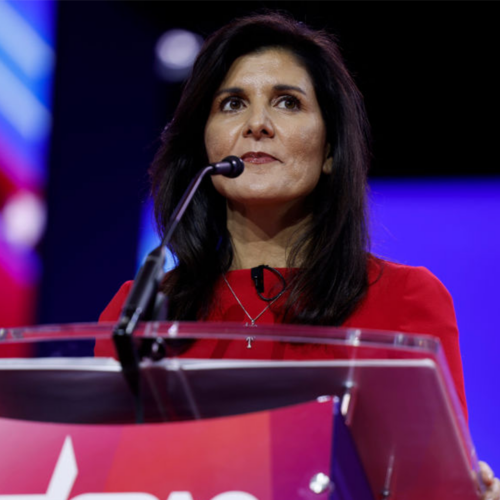SAN JOSE, Calif. — One day in February 2021, Michael Verdu wrote to some of his colleagues that their boss, Meta CEO Mark Zuckerberg, had asked him to look into acquiring a virtual reality-powered fitness app. It’s a “pretty strong signal that he cares about the category,” Verdu wrote.
“My recollection is we were pretty aligned in looking at it as a way to broaden the audience for VR,” Verdu said.
Lawyers for the FTC have been using Verdu’s and other Meta employees’ testimony to make the argument that Facebook’s parent company is squashing competition in the niche market of virtual reality-powered fitness apps by buying the maker of the popular workout game “Supernatural.”
The FTC’s case hinges on the idea that Meta’s decision to acquire Within rather than create its own VR fitness app deprives consumers of vibrant choices in the market sometime in the future. Meta’s lawyers have countered that the company was never serious about building its own fitness app because it would have been too complicated a process. Zuckerberg is expected to testify soon about Meta’s acquisition in the United States District Court for the Northern District of California.
Testimony this past week and a half about Meta’s years-long effort to expand into the virtual reality-powered fitness market has revealed just how difficult the company’s larger goal of building the metaverse has become. Meta has staked its future on the idea that people one day will want to work with their colleagues, shop with their friends and spend time with their loved ones in immersive digital realms that are accessed through augmented and virtual reality services.
Meta has funneled billions of dollars into trying to make its metaverse vision a reality. Even as the company suffered declining revenue and slashed 13 percent of its workforce this year in the face of an uncertain economic environment, Meta has remained steadfast in its investment in VR. The company said earlier this year that it expects its virtual and augmented reality division to lose even more money next year. In October, Meta unveiled Quest Pro, a new $1,500 VR headset aimed at helping businesses and workers improve their productivity.
So far, since buying the small virtual reality start-up Oculus eight years ago, Meta has become the dominant headset maker player in the space, claiming 78 percent of all virtual reality headset sales in 2021, according to the lawsuit.
But Meta is facing intensifying competition in a market that is still nascent. PlayStation is planning to release a new virtual reality headset early next year. Apple is also expected to release a competing headset next year, according to Bloomberg News. Taiwan-based High Tech Computer Corp., and Pico — owned by China’s ByteDance, which also owns TikTok, are also rivals in the space.
At the heart of the FTC’s case is a buzzy virtual reality app made by the Los Angeles-based Within studio called Supernatural, which offers its users daily exercise routines in seemingly extravagant settings. Instead of cycling on a stationary bike while looking at your living room wall, Supernatural promises its subscribers that they can put on a virtual reality headset and take an aerobics class on a snowy mountain or play a new sport in futuristic setting for less than $20 a month.
Executives over the last week and a half have highlighted some of Meta’s obstacles in spurring adoption of VR that they thought VR fitness apps could help solve. For starters, Meta’s existing headsets users are overwhelmingly young males attracted to immersive video games on Quest headsets. In December 2019, Verdu had told staffers that women were only 7 percent of Quest headset users, according to an exhibit and his testimony. Meta executives thought a fitness app would bring in more women and slightly older users to their services.
“If you look at the age profile of users in a lot of these [fitness] apps — a lot of these people actually are much broader in their age range then you would normally find in VR,” said Anshel Sag, an analyst at Moor Insights & Strategy who covers virtual reality businesses. “It [VR fitness] reaches a bigger audience of both men and women.”
Meta also saw VR fitness as a strategy to expand its revenue model. Currently, many VR game-makers make money when users first purchase the game and sometimes through ad hoc in-app purchases. Meta executives thought that fitness apps could adopt a subscription model, which could deter game makers from overcharging their customers while also offering the social media giant a steady income stream, according to testimony. Meta usually takes a 30 percent cut from app purchases made on its Quest headsets.
Fitness apps also have the potential to turn Quest VR headsets into a routine for their users. Historically, people often would use a Meta VR headset only for a few weeks after its purchase. But if Quest headsets are part of users’ exercise routines that might increase the regularity with which people use the devices.
Testimony and exhibits reveal that Meta’s interest in fitness-related VR products began as early as 2019. On Sept. 30, 2019, Verdu sent an email to Nir Blumberger, now Meta’s vice president of corporate development, and Rade Stojsavljevic, now the director of the company’s in-house studios, and other employees entitled “Project Saturday,” according to Verdu’s testimony. That was the internal code name the company was calling their effort to acquire the studio behind Beat Saber, a popular rhythm game, in which users slash objects hurtling toward them along the beat of energetic music in a futuristic world.
In that email, Verdu proclaims that Beat Saber is a Quest “system seller” — a term used in Silicon Valley to describe content and software that drive sales of hardware platforms. In fact, in September 2019 at least 50 percent of people who bought a Quest headset later downloaded Beat Saber. Verdu also wrote that Beat Saber also has a “strategic value” as a potential subscription service and as a vector into fitness.
“It’s sort of like if you go to the nightclub and dance and sweat,” Verdu testified. “It’s like you actually are getting some fitness benefit out of that” but the app is not specifically formatted for fitness.
In November 2019, Meta announced it acquired Beat Games, the maker of Beat Saber. Over the years, Meta executives mulled whether to refashion Beat Saber as a fitness app. While some inside Meta thought that would be a great way to take advantage of an emerging market, others thought it would dilute the brand of a widely successful product. There was also some discussion about forming a relationship with Peloton — an idea that Zuckerberg supported at one point, according to Verdu.
“I am bullish on fitness. A partnership with Peloton for Beat Saber sounds awesome,” Zuckerberg wrote. “I’d love to see that happen. Let me know how I can help.”
But there were always challenges to turning Beat Saber into a fitness app, according to witnesses. For starters, Meta would have to use experts to validate that the app does in fact improve fitness if the company was going to market it that way. And then the company might have to create a daily cadence of workout routines to offer enough content to make it a viable product. And Meta had promised Beat Games’ leaders they would retain creative control over the product after the acquisition but they were focused on other priorities, according to Verdu.
It’s “a lot of work even when you have the founder lined up,” Verdu testified.
FTC lawyers have countered that Meta employs thousands of developers who could have helped reconfigure the existing Beat Saber app or even create its own VR fitness program. The company, which earned $27.71 billion last quarter, had the resources to hire more experts, they argue.
But by 2021, Zuckerberg appeared to be favoring an acquisition of a fitness app. On Feb. 22 that year Zuckerberg emailed Verdu and asked him, “beyond gaming have you thought about acquiring FitXR or Supernatural,” referencing two leading VR fitness apps. Verdu responded by saying, “I’m poking at FitXR.”
Two days later, Verdu sent a colleague a message saying, “Zuck is still hounding me about fitness too!” In March 2021, Verdu sent an email to a colleague saying “Zuck has pressed me 5 different times about acquiring a fitness company.”
Meta executives debated whether to purchase Within or rival VR fitness app, FitXR, according to Verdu. FitXR, which also offers exercise classes in virtual reality, would have been cheaper because they hadn’t yet matched Supernatural’s ability to deliver new content daily, according to Verdu. Meta was leaning toward purchasing the more established Within, but what sped up that decision, Verdu testified, was a rumor that Apple was also thinking of acquiring Supernatural. Verdu testified that he thought the Within app was worth a purchase price of up to $500 million.
While Meta hadn’t been quite ready to “pull the trigger” on the deal to acquire Within, it’s “pretty far along and Zuck really wanted to do it,” Verdu wrote to a colleague in July 2021, according to his testimony.
Months later, Zuckerberg would reveal just how much he wanted it. On Oct. 28, 2021, the company renamed itself Meta, signaling that transforming human communication through augmented and virtual reality was the next stage. A day later, Meta announced it had acquired Within.





